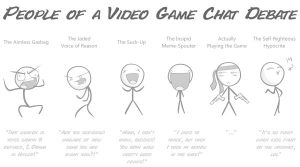The other day at a Halloween party I got into a discussion with a fellow who seemed to have a confused idea of the relationship between Censorship and Freedom of Speech. It’s not the first time I’ve seen this misunderstanding both in person and more commonly in the comments section on news articles.
Today I spotted a story that I think highlights people’s confusion and I hope might illustrate the difference for you.
What is the Confusion in Censorship and Freedom of Speech?
The confusion I see fairly frequently is any type of censorship is a violation of freedom of speech. People who make this mistake generally do so because it leads them to believe their political favorites are being denied their freedom of speech through censorship.
In reality, censorship is, in most cases, actually an example of freedom of speech.
The Situation that illustrates the Proper Relationship
How are censorship and freedom of speech connected? I think sports organizations illustrate the real relationship between the two fairly well. The Big 12 athletic conferenced fined Utah Athletic Director Mark Harlan for his pointed criticism of referees after BYU defeated Utah in a football game.
My party friend would certainly argue Harlan is suffering from censorship and a denial of his freedom of speech but this is false.
The freedom of speech issue at stake here is the conference’s ability to apply censorship to members of their organization. If the government came in and fined or imprisoned the conference officials for their punishment of Harlan, that would be a violation of their freedom of speech.
The act of censorship is not a violation of freedom of speech but is actually, in this case, an expression of it. Freedom of Speech is a concept that applies to the government preventing people from speaking out, generally in a negative way about the government, but also more broadly as well.
When the Big 12 censors Harlan, which they are most certainly doing, they are not violating his freedom of speech, they are actually exercising their own.
Any organization, other than the government, can censor people as part of their rules and regulations. Even the government can do so under various circumstances. The Hatch Act prevents government officials from expressing partisanship. This is, obviously, censorship, but it is not violation of freedom of speech.
Are Athletic Organizations right to Censor Criticism of Officials?
This is another question entirely and one I thought I’d touch on briefly. I think everyone should be able to criticize anyone else, slander and defamation excluded, without fear of penalty. But that being said, the people who make the rules for the Big 12 conference are entitled to do so at their whim. As are the other athletic organizations that largely have the same rule in regards to criticism of officials.
Conclusion
None of us like it when someone speaking on a subject with which we agree is censored by an organization, but it is not a violation of freedom of speech. Understanding the relationship between censorship and freedom of speech is part of being free, although so is misunderstanding it.
Tom Liberman



















